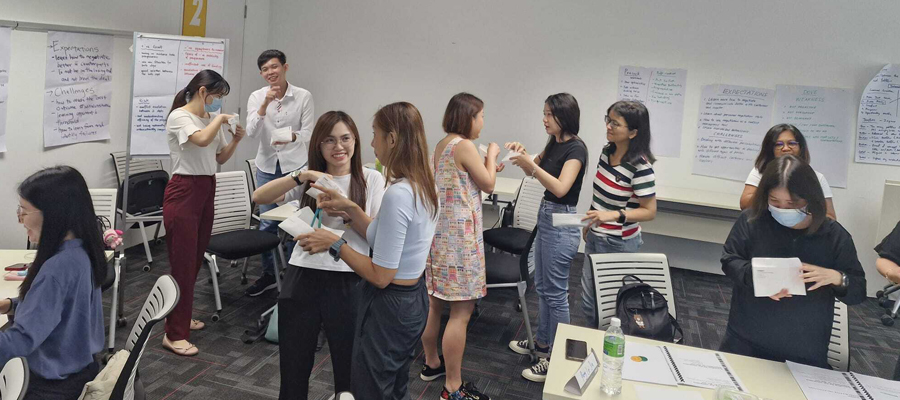
Building High Performance Teams: Leverage and Optimize Team Dynamics to Effectuate Greater Results
Today, more than ever business success requires awareness and effective communication skills. Working, meeting, dealing, negotiating and corresponding with team members of different backgrounds can be challenges arisen from diversity, issues that surface in diverse workgroups.
Understanding and appreciating differences ultimately promotes clearer communication, breaks down barriers, builds trust, strengthens relationships, opens horizons and yields tangible results in terms of business success.
This workshop helps participants move beyond tolerance, patronisation, generosity, good deeds and common decency to confronting differences and developing the flexibility that allows appreciation and respect for both similarities and differences among team members. Ultimately, participants will learn to manage different people effectively and understand them better to achieve productive outcomes.
OBJECTIVES
- Increase their behavioural and emotional self-awareness.
- Communicate effectively with people of different backgrounds.
- Improve team work.
- Appreciating differences.
OUTLINE
Understanding People Communication Tendencies
- People reading.
- Using the DISC to understand an individual’s outward behaviour and thought processes and appreciating differences; turning them into positive outcomes.
- Using the DISC profile to identify one’s and other people’s working and communication styles.
- How to use the DISC psychometric tool to communicate to different groups of people and managing their subordinates effectively.
Qualities of a Performing Team
- Tuckman’s model of team dynamics.
- Identifying team members’ developmental levels, their current level of competence and commitment and improving team work by adopting different leadership styles.
Application
- How to motivate team members effectively.
- How to identify the team member’s competency, development levels and adopting the appropriate communication style accordingly.
Final Review of Learning and Forward Action Plan
- Debrief and application of learning points in the workplace.
- Questions and answers.
- Moving forward—Personal action plans.
DURATION
One Day
Effective Managerial and Leadership Skills: Inspiring, Energizing and Motivating Others
This seminar is to equip managers with a clear understanding of the importance of managing people and enhancing leadership effectiveness within the organisation and its impact on others. Whether middle managers, senior managers and C-Suite leaders, such individuals will need to develop their relevant management and leadership skills, knowledge and confidence to enable them to effectively lead their teams to ensure that their results meet the organisation’s standards and expectations crucial to the establishment’s success in today’s changing working environment.
OBJECTIVES
- Understand the current approaches to effective leadership.
- Distinguish differences between leadership and management.
- Analyse strengths and areas for development.
- Be more effective in communicating and leading their teams.
- Manage and support organisational change in times of technology disruption (Industry 4.0).
- Manage team conflicts in a ‘win-win’ situation.
- Engage in group problem solving and decision making.
- Determine what motivates and what does not motivate team members.
OUTLINE
Leadership Roles
- A comparative analysis of management and leadership.
- The changing role of the ‘Leader’ – Leadership with ownership.
- The purpose, functions and roles of a leader.
- What makes an effective leader in stakeholder management?
- Must-know leadership qualities such as self-assessment, sharp perception etc.
- Importance of branding at the workplace in business partnering.
- How to be persuasive using the “3 Greeks”.
- Increasing personal credibility using the “3 V’s”—verbal, vocal and visual elements.
Situational Leadership Styles
- Understanding Tuckman’s model of team dynamics with added steps of adjourning and transforming.
- What are the qualities of a performing team?
- Identifying team members’ developmental levels, their current level of competence and commitment.
- What appropriate leadership styles should you adopt using Hersey & Blanchard’s situational theory?
- What actions can you take to lead them currently and to the next level?
Final Review of Learning and Forward Action Plan
- Debrief and application of learning points in the workplace.
- Questions and answers.
- Moving forward—Personal action plans.
DURATION
One Day
Leaders as Effective Coach
This high energy, interactive workshop defies the conventional methods of “do’s and don’ts” of communication 101 training. Leaders will become aware of the opportunities to thrive with change and learn critical skills needed to enhance their career development through effective coaching.
OBJECTIVES
- Improve team members’ performance levels.
- Develop coaching skills.
- Promote work productivity and sense of belonging in the workplace.
OUTLINE
Team Building Fundamentals
Situational Leadership Styles
- Identifying team members’ developmental levels, their current level of competence and commitment.
- When could managers help team members achieve their potential?
- What appropriate leadership styles should be adopted?
- What actions can be taken to lead them currently and to the next level?
Coaching Skills
- Coach using the GROW model.
- Roles of coach and coachee.
- The learners will now be given some work-based situations where they will need to be the coach and the coachee.
Final Review of learning and Forward Actions
- Debrief and application of learning points in the workplace.
- Questions and answers.
- Moving forward - Personal Action Plans for Application of Learning.
Duration
One Day
